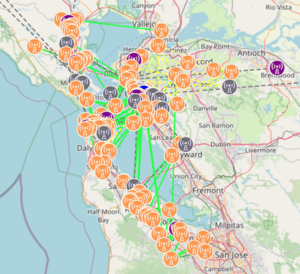Bay Area Mesh: Difference between revisions
Jump to navigation
Jump to search
m (→Help) |
|||
| Line 23: | Line 23: | ||
*[[Cables]] |
*[[Cables]] |
||
*[[Cameras]] |
*[[Cameras]] |
||
| + | *[[Maps]] |
||
*[[Network Time Protocol]] |
*[[Network Time Protocol]] |
||
*[[Phones & PBX]] |
*[[Phones & PBX]] |
||
Revision as of 16:06, 10 October 2022
Goals
- Education, Research & Mentorship of the Amateur Radio Community on digital network technologies.
- Rapid ad-hoc communication deployments during disasters and emergencies.
- Reliable, fault-tolerant networks that served agencies can protect Bay Area residents and save lives during disaster situations
General Information
- AREDN Beginners Guide
- Code of Conduct
- Maps - Various maps of mesh nodes and the connections between them
- Tools - Helpful information and tools
- Videos - Helpful videos
- High sites - Elevated sites which are easy to point a radio at
- Commercial WISPs - Local commercial WISPs which often share locations
Help
- Band Plan
- Bandwidth Consumption
- Batteries
- Cables
- Cameras
- Maps
- Network Time Protocol
- Phones & PBX
- Power-over-Ethernet
- Solar
Projects
- Bay Area Backbone
- Lafayette Police Department / Lamorinda Network
- Sierra-Lassen-Plumas Interoperability Network (SLPnet)
- South County Amateur Radio Emergency Services (SCARES)
Past Projects
- Link Quality Management
- Network Storms
- S11 / S22 sweeps on 5ghz antennas RAW data
- Air Quality
- Radiation monitoring
- SFWEM GitHub
- Alameda Emergency Services (OES)
- Red Cross
Conferences
- Pacificon - Annual pacific coast HAM conference by MDARC
- SCALE - Southern California Linux Conference (with a HAM presence)
- BayCon - Annual meeting of the BayNet Amateur Radio Club in the San Francisco Bay Area
